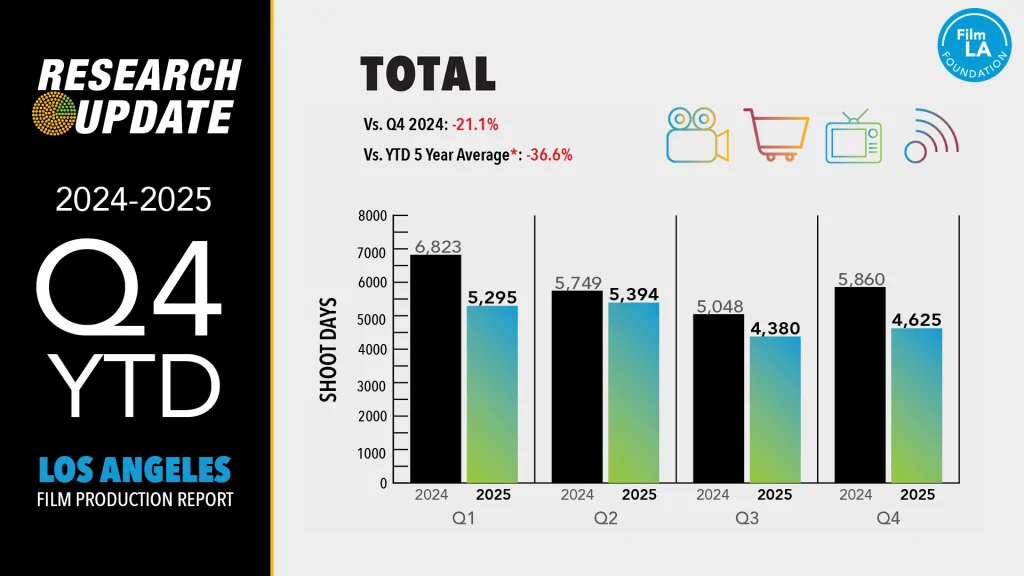“I’m thinking about listing my property for filming. This is the first time I’ve done this. What am I getting myself into?”
-Anonymous
For nearly 30 years, FilmLA has been Los Angeles’ leading resource connecting filmmakers and the communities in which they film. As a liaison between our government clients, film industry customers and local neighborhoods, we seek a sustainable level of filming that is beneficial to all.
One of the most common questions we receive from the community is: “How do I list my home (or business, or condo, or co-op, or warehouse) for use in film, television or commercial production?” Less often asked, but even more important, is what opportunities and challenges film hosts should expect, if they take the plunge.
There are several quality resources to help answer the latter question. One of them, “Your Property in a Starring Role” is a free publication available online from the California Film Commission.
We also reached out to Karla Maqueda, Outreach Liaison from FilmLA’s Solution Services Team. Drawing on her experience working with film hosts and their neighbors, we are happy to share with you some pros and cons of listing your property for filming.
Pros: Things to Look Forward To
Earn Extra Income Hosting Filming
The most obvious reason to host filming at your property is: you get paid! That said, the rate film hosts earn per day varies and the ability to charge a premium depends on the uniqueness of the location. Price ranges are set by the film host. Charging a high location fee is possible if your property is highly desirable. With rates on the lower end, your property will be more attractive to student filmmakers and lower-budget productions.
As Karla notes, “We have heard hosts say they charge $10,000/day on the high end, and others who say they charge only a few hundred dollars per day. Film hosts have control over who to allow on their property; the features you offer and the rates you set will determine your opportunities and clientele.”
Help Promote Neighborhood Pride
Not only is it cool to see your property on screen, there are also other perks to occasionally having filming in your neighborhood. In Greater Los Angeles, the film industry is a leading source of well-paying jobs. By welcoming filming into your community, you support an ecosystem that employs hundreds of thousands of people and stimulates thousands of local businesses. There are even parts of the region where neighbors have banded together in mutual support of filming, helping multiple property owners to benefit financially from each shoot.
As Karla shares, “It is not at all uncommon for productions to rent driveways to park film vehicles, or pay for the use of front yards for activities like crew catering. I have also seen productions open up their catering tables to neighbors. Additionally, productions are asked to clean up after themselves and often do a lot of sprucing up before shooting their scenes.“
Location Services Offer Support
Many film hosts like the experience of direct negotiation with filmmakers. For those who do not or who find the concept overwhelming, companies called “Location Services” exist to help manage these interactions. Look for them in a film industry resource like The Creative Handbook.
As Karla notes, “Before signing a contract for property representation, we recommend you research different Location Services and ensure they communicate what type of rules and terms they will abide by when organizing film shoots for you. We cannot recommend a specific location service to you, but any company you hire should take time to walk you through the process and make sure you are comfortable saying ‘yes’ to production.”
Cons: Things to Watch Out For
Filming Can Affect Your Neighbors
Welcoming filmmakers into your community can do a lot to bring neighbors together. It can also sour relationships between neighbors if done with poor communication. Ultimately, your neighbors will hold you personally responsible for the experience they have with filming. And although Notices of Filming from FilmLA will alert your neighbors that filming is coming, proactively talking to them and being considerate of their preferences will help you say yes to production more often.
“Speaking to your neighbors and considering their preferences will greatly help,” Karla advises. “For example, if you have a neighbor who does not want night activity – perhaps because he is a parent to a newborn — you can let productions know that you will not accept an overnight job. You could also ask productions to avoid parking in front of your neighbor’s home to reduce loud noise. You can always call FilmLA and ask for more suggestions to make filming less impactful to neighbors. The same advice we would give to productions, we can also share with you.”
Film Vehicles Need Places to Park
While Greater Los Angeles is very film-friendly, access to parking is a real concern across its many neighborhoods. FilmLA requires productions to keep most of their vehicles at a base camp and bring only what is needed to the location to avoid impacting neighbors. Spillover of cast and crew parking to area side streets is also prohibited. Different neighborhoods will have different preferences, but sometimes any impact to parking can feel like too much.
“Parking can be a challenge,” Karla admits. “Here in Solution Services, we are always happy to be a resource and provide recommendations for less impactful filming. Where parking is an issue, I have seen productions try to give access back to the neighborhood through several tactics, such as returning a portion of their parking to the community after an early wrap-up.”
Injuries and Property Damage Can Occur
A common concern for property owners is how to protect themselves, should something go wrong during filming. For example, what if a crew member setting up a stand falls down a staircase and injures his leg? With a valid film permit, the production company will have verified liability insurance, offering film hosts additional peace of mind.
But what if the film company doesn’t obtain a valid film permit? Filming without a valid permit is illegal, and if discovered, exposes the production company to the risk of a visit from law enforcement, immediate shutdown, and fines. Hosting unpermitted filming is also inadvisable for property owners, because filming without a permit can invalidate the production company’s insurance, leaving the host potentially liable for personal injuries and property damage.
As Karla notes, “Location Services will usually verify permit availability for you, but as a host you can also ask to see the permit as production arrives on location. If you invite a production onto your property to film without a permit, you are placing yourself at personal risk. Anyone can call FilmLA’s 24/7 line for up-to-date information regarding production, as well as to report illegal filming or permit violations of any kind.”
Are you an experienced pro with a tip for first-time film hosts? Share your guidance with readers by posting a comment below!






1 comment
Debra Heller
we just used 59 east 66 townhouse, for the filming of American Love Story, and thought you would be interested in using it for other films or shoots. If you need pictures, please let me know. We charge $15,000 FOR DAYS TO SET UP AND $20,000 FOR DAYS YOU FILM.